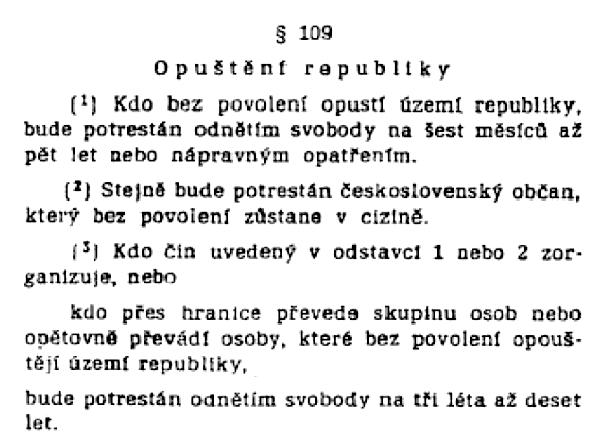During the rule of the Communist Party of Czechoslovakia from the coup in February 1948 until the Velvet Resolution in 1989, thousands of Czechoslovak citizens went beyond the borders. They were leaving predominantly from political, religious and economic reasons. The citizens of Czechoslovakia could not travel abroad freely, mainly into capitalist nations. Until 1948, crossing the border without a valid passport was viewed as a violation. After February 1948, the Ministry of Interior revoked the validity of passports and via a law passed in 1949, the citizens of Czechoslovakia lost their legal right for issue of a passport.
In the period of unlawfulness the communist regime violated basic human rights, which it was bound to adhere to by signing international agreements. As soon as 1975, the president of the Czechoslovak Socialist Republic Gustáv Husák, signed the International Pact on the Civil and Political Rights and the International Pact on Economic, Social and Cultural Rights. Both documents were ratified by the Federal Assembly of the CSR and after its publication in the codex of law in 1976 came into effect. However, the commitments of the representatives of state power were not realized in practice and only stayed on paper. The political leadership of CSR did not even respect the Universal Declaration of Human Right, where , in Article 13 is says: „Everyone has a right to leave any country, even his own, and return to his own country.
To exit the republic, a person needed a leaving appendix to his visas. This leaving appendix was in fact a stamp in a passport which stated where and for long is the person allowed to travel. Citizens who were trying to obtain it were inspected to a very fine detail. The members of parliament and the officials of the Communist Party of Czechoslovakia were not inspected at all when it came to leaving the country. The leaving appendix was an inseparable part of a travel document. Such measures secured a nationwide overview of the issuing the permits to enter capitalist states as well as securing an operative and thematic overview about these trips. Apart from the appendix, the person who wanted to leave had to acquire a foreign exchange promise. This was a written permission from the bank for the Exchange of certain amount of Czechoslovak crowns for a foreign currency needed to travel to capitalist nations. The Czechoslovak National Bank announced the allocation or refusal of foreign currency once a year (usually at the beginning of the year). The applications were usually submitted a year in advance. A regular citizen without the influence of the Communist Party of Czechoslovakia and connexions could wait several years before being approved. Every citizen could submit an application, but those submitted by „unreliable“ people were always denied with the explanation that their leave is „not with the accordance of the state interests of the CSR“. The decision of who is allowed to obtain a foreign exchange promise lay in the hands of the party authorities. Therefore, only a specific group of people could travel abroad without problems.
In the years 1977-1979, over 400 a year attempted to emigrate. Beginning in 1980, the emigration attempts began to increase. The travel agencies organized educational trips, although many participants did not return back from them. The managers of the trips attempted to mitigate emigration, among other measures, by confiscating the passports of the participants. Vacation trips to Yugoslavia were used to the same extent. A weekend trips to Vienna by boat were also organized. From 1983, the number of émigrés started to slowly decline, since the State Security Service tightened up inspections and refusal of people who applied for a foreign exchange promise or leaving appendix. The unauthorized leaving of the republic was, according to Article 109 of the Criminal Codex, considered a crime and was punishable imprisonment for 6 months to 10 years.



